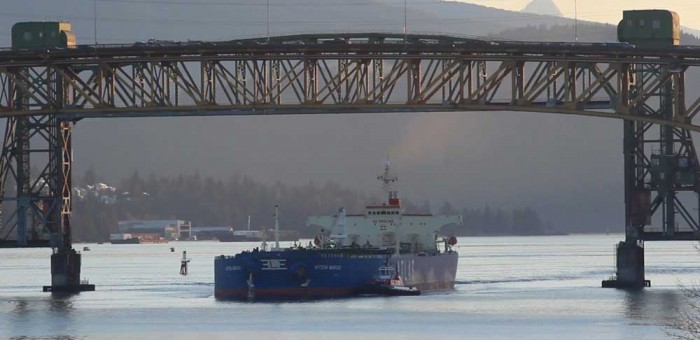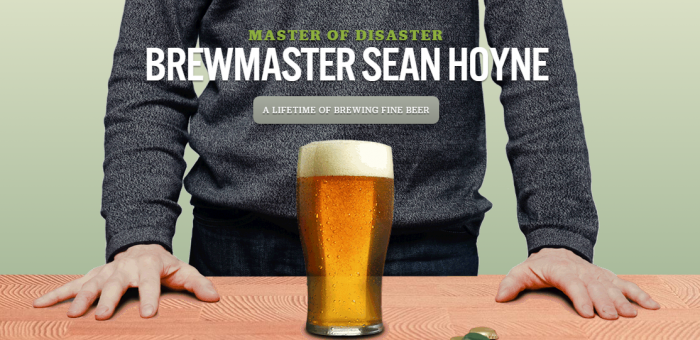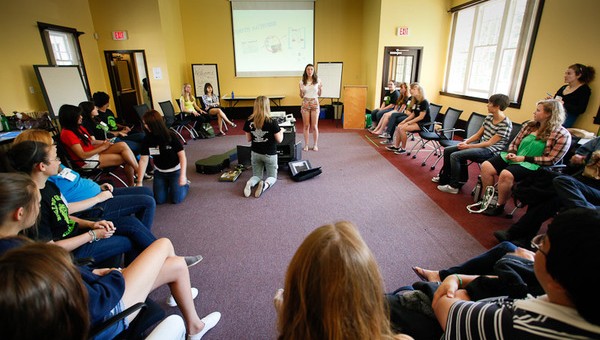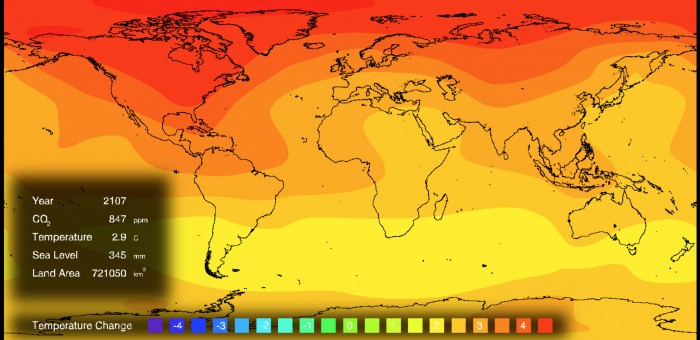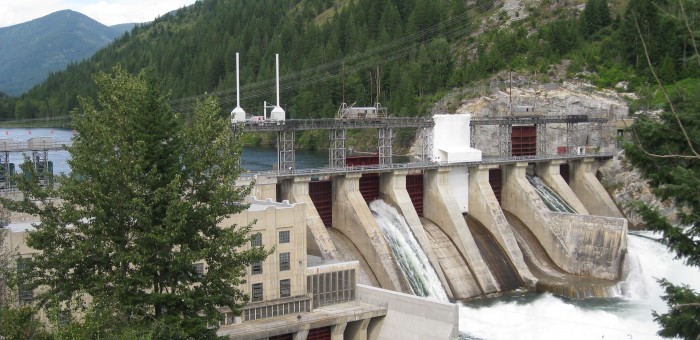Issues & Community Blog - Andrew Weaver: A Climate for Hope - Page 147
Key Issues Remain Unaddressed in Draft Conditions on Trans Mountain Pipeline
Media Release – August 12th 2015
Key Issues Remain Unaddressed in Draft Conditions on Trans Mountain Pipeline
For Immediate Release
Victoria B.C. – Today the National Energy Board today released 145 draft conditions for the Trans Mountain Pipeline. While highlighting a number of existing deficiencies in the application, the conditions fail to address several key concerns with the project.
“There appears to be no reference to the unique properties of diluted bitumen and its fate and behaviour in the marine environment,” said Andrew Weaver, MLA for Oak Bay Gordon head and Deputy Leader of the BC Greens. “We still have very limited scientific understanding as to what would happen if a diluted bitumen spill were to occur in our coastal waters. But published evidence suggests that a spill clean up would be much more difficult than in the case for traditional crude, if it is possible at all.”
Back in 2013, the NEB’s draft conditions for Enbridge’s Northern Gateway Pipeline included a requirement to fund a research program to study the behaviour of heavy oil (diluted bitumen) spills in freshwater and marine environments. Yet today there was no mention of any requirement for such a study.
One of the conditions released today touches on the need to expand the existing oil spill response capacity. However it fails to acknowledge the fact that there is evidence to suggest that Trans Mountain has in some cases overstated the existing response abilities.
“I am pleased that the NEB is requiring Trans Mountain to have a plan to respond to bigger spills faster. But the fact remains that under numerous weather conditions, a spill response would be impossible or severely constrained. Furthermore, there is a substantial difference between actual recovery rates and spill response capacity.” said Weaver
“It’s hard not to draw comparisons back to the Enbridge review panel, where 199 conditions were released and cross examination ensured that the risks of the project were far more rigourously examined and questioned,” noted Andrew Weaver. “The review process for the Trans Mountain project was degraded to a paperwork exchange, and many critical issues with the project remain unaddressed to this day.”
Dr. Weaver’s final argument will be available in early September when it is submitted to the National Energy Board.
-30-
Media Contact
Mat Wright
Press Secretary – Andrew Weaver, MLA
Cell: (1) 250 216 3382 Email:
Mat.Wright@leg.bc.ca
Celebrating Local Businesses in Our Community – Hoyne Brewing Company
This is the fourth in our series highlighting innovation and creativity within our region’s business sector.
It was sweltering hot and the brewery was buzzing the afternoon we met with Sean Hoyne. As people filtered through filling growlers with their favourite beer we asked Sean to tell us about his brewery and how they got started. Though the Hoyne Brewing Company has only been open for three and a half years, Sean started their story in the 1970s – before commercial craft brewing had even begun in Canada.
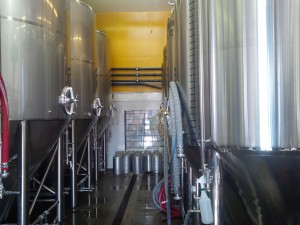 Frank Appleton, who Sean credits as the father of the craft beer movement in British Columbia, was a quality control supervisor at Carling O’Keefe’s but he had grown tired of the corporate beer scene and decided to quit in 1972. He spent the 1970s and 80s writing articles for the Harrowsmith magazine while brewing beer at his home in Edgewood, B.C. One of those articles, about the joys of home-brewing, caught the eye of John Mitchell who, at the time, was the co-owner and manager of the Troller Ale House in Horseshoe Bay.
Frank Appleton, who Sean credits as the father of the craft beer movement in British Columbia, was a quality control supervisor at Carling O’Keefe’s but he had grown tired of the corporate beer scene and decided to quit in 1972. He spent the 1970s and 80s writing articles for the Harrowsmith magazine while brewing beer at his home in Edgewood, B.C. One of those articles, about the joys of home-brewing, caught the eye of John Mitchell who, at the time, was the co-owner and manager of the Troller Ale House in Horseshoe Bay.
Mitchell had grown up in pub-rich England and was frustrated by the limited selection of beer in Canada. He tracked down Appleton and asked him if he would help him start a brewpub, a pub where good beer was both brewed and served. Far easier said than done at the best of times, Mitchell and Appleton first had to convince the local and federal governments to pass legislation that would make brewpubs legal. Previously, provincial law prohibited the public sale of beer at breweries but in 1981, after many meetings and rounds of legislation, they got approval to start brewing – and selling – their own beer from a single establishment (with the caveat that a commercial road separated the brewery and pub). Mitchell and Appleton opened Horseshoe Bay Brewery with a little store across the street on the waterfront, the first brewpub to open in North America since prohibition. From there, Mitchell and Appleton went on to open Spinnakers, Canada’s first in-house brewpub, and help dozens of other local breweries get started.
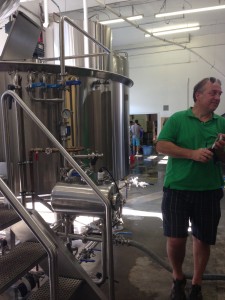 Sean enters this story, homebrewed six-pack in hand, in the late 1980s. He had a science degree to back up his beer brewing passion and he was keen to learn everything Appleton could teach him. He brought a case of homemade beer to his job interview with Appleton and let the beer speak for itself while they talked literature. Sean got the job and the two of them went on to set up the brewery in Swans Hotel in 1989. After a few years in the brewmaster role at Swans, Sean left to build the brewery at Canoe Brewpub. “I brewed there for 13 years, focusing on developing award-winning beers and fostering a sense of community between brewers and beer enthusiasts,” he said of his time at Canoe.
Sean enters this story, homebrewed six-pack in hand, in the late 1980s. He had a science degree to back up his beer brewing passion and he was keen to learn everything Appleton could teach him. He brought a case of homemade beer to his job interview with Appleton and let the beer speak for itself while they talked literature. Sean got the job and the two of them went on to set up the brewery in Swans Hotel in 1989. After a few years in the brewmaster role at Swans, Sean left to build the brewery at Canoe Brewpub. “I brewed there for 13 years, focusing on developing award-winning beers and fostering a sense of community between brewers and beer enthusiasts,” he said of his time at Canoe.
Ready to start a new chapter in a sector that was enjoying incredible public support, Sean moved into a space just outside of downtown Victoria and started to build the Hoyne Brewing Company. Starting with a team of one (himself), Sean is now one of 20 working at the brewery. In addition to serving liquor stores and customers who come into the brewery, Hoyne sells directly to bars and restaurants. They do their own deliveries, he explained, so they can provide the best service possible – even when their bottom line would recommend doing otherwise. They have partnered with Geazone, a local zero-emissions delivery service that uses electric cars and bike courriers, for their distribution. It costs more, said Sean, “but I like supporting Andrew, [Geazone’s president and CEO], because he is a young entrepreneur doing the right thing.” They even do their Victoria to Vancouver run with the zero-emissions fleet. Sean ensures two people are on each delivery run so they can share the job and help with the loading and rearranging of kegs in their drop-point’s cold room. It may seem like a simple gesture, but one that I’m sure is greatly appreciated by servers sent down to switch heavy kegs during rush hours. “We do what we can to support other businesses,” said Sean.
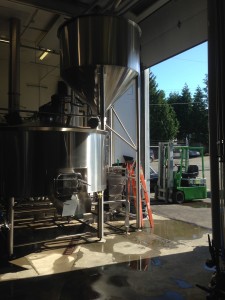 A central part of Hoyne’s mandate is to help wherever they can. It is a value system that has triggered countless positive ripple effects, both locally and abroad. They support charities (financially or with beer, where appropriate), including the Dirty Walls Project in India and source their equipment, hops, and malt from within B.C. The shiny stainless steel tanks found throughout the brewery were made on Vancouver Island and twice as expensive as their foreign-made counterparts, but the connections and collaborative friendships the brewery has made supporting local workers has made it more than worthwhile, said Sean. “If something is wrong with the tanks, they’ll be here at a moment’s notice to help out.” Local farmers are often at the brewery too, picking up loads of spent grain for their animals and gardens.
A central part of Hoyne’s mandate is to help wherever they can. It is a value system that has triggered countless positive ripple effects, both locally and abroad. They support charities (financially or with beer, where appropriate), including the Dirty Walls Project in India and source their equipment, hops, and malt from within B.C. The shiny stainless steel tanks found throughout the brewery were made on Vancouver Island and twice as expensive as their foreign-made counterparts, but the connections and collaborative friendships the brewery has made supporting local workers has made it more than worthwhile, said Sean. “If something is wrong with the tanks, they’ll be here at a moment’s notice to help out.” Local farmers are often at the brewery too, picking up loads of spent grain for their animals and gardens.
Comparing the rise of local craft breweries in B.C. with mega breweries like Molson that are now all run by non-Canadian owners (with the exception of Pacific Western), Sean attributes craft’s success with the sector’s determination to deviate from the mass-production business model. “Local craft breweries have social license,” said Sean. “They are involved in the community, transparent, open to the public, and authentic. I am in this industry because I like beer, to me it represents enjoyment and community.”
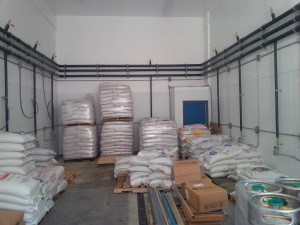 “People are always welcome to stop by our brewery,” Sean continued, “and every ingredient is listed on our bottles. We are proud of that.” As beer is not considered a ‘food product’ by the Canadian Food Inspection Agency, ingredient lists are not a requirement. Mass-produced beers, Sean explained, contain preservatives – which he stressed are not necessary unless you are selling old beer. “[At Hoyne] we don’t deliver our beer past where we can ensure it will arrive fresh so we don’t have to add anything extra, like preservatives. You can do things differently.”
“People are always welcome to stop by our brewery,” Sean continued, “and every ingredient is listed on our bottles. We are proud of that.” As beer is not considered a ‘food product’ by the Canadian Food Inspection Agency, ingredient lists are not a requirement. Mass-produced beers, Sean explained, contain preservatives – which he stressed are not necessary unless you are selling old beer. “[At Hoyne] we don’t deliver our beer past where we can ensure it will arrive fresh so we don’t have to add anything extra, like preservatives. You can do things differently.”
Sean and his team have made numerous adjustments to the status quo, from allowing their beer to naturally carbonate during the fermentation process (instead of releasing the CO2 and force-carbonating the beverage further along the production line) to building a glycol refrigeration system that allows them to cool individual tanks instead of the entire room.
As an enthusiastic supporter of the entire local craft beer sector, it was a pleasure to see the process in action and learn more about Hoyne’s community-based business model. Though I opted out of the taste-testing portion of my visit, because I was driving and had a CBC interview immediately afterwards, I already knew from experience that Hoyne’s Devil’s Dream IPA is one of my favourites.
Celebrating youth in our community – Erin Attwell
This is the 20th in our series of stories celebrating the outstanding accomplishments of youth in our community. These inspirational young adults are enriching our lives with their passion and commitment to the betterment of society.
Erin Attwell
 In 1929 the Hungarian writer Frigyes Karinthy put forth the notion that each and every person is only six degrees of separation from one another. But anyone who has lived in Victoria for a few years knows that it’s more like one degree of separation, or two degrees at most, within our community. And in the case of Erin, it is no different.
In 1929 the Hungarian writer Frigyes Karinthy put forth the notion that each and every person is only six degrees of separation from one another. But anyone who has lived in Victoria for a few years knows that it’s more like one degree of separation, or two degrees at most, within our community. And in the case of Erin, it is no different.
I first met Erin when she was three years old. She was a year younger than my son and both were attending Lambrick Park Preschool. Twenty years earlier, her father and I played rugby together at UVic and I was a TA for his Calculus class. While I periodically saw her father on the Tyndall turf coaching his son’s (and Erin’s twin brother’s) soccer team, I had no idea what Erin had been up to since preschool. So you can imagine my surprise when I learned on social media that the Erin Attwell recently won the overall General Classification cycling Yellow Jersey and Gold Medal at the Tour de la Rèleve de Rimouski.
 Erin was born in Victoria and attended Frank Hobbs Elementary School from kindergarten to Grade 5. In Grade six she enrolled in Maria Montessori Academy where she is currently entering Grade 11. Maria Montessori Academy is a small school with 300 students from kindergarten to Grade 12. Erin loves the small school and sense of community there. She describes it as a supportive learning environment with self-directed learning and a focus on independence. Students in grades 9 through 12 work together on projects in a common area. Her grade 10 class had 10 students and there were 7 students in the grad class of 2015. The Montessori philosophy teaches students to manage their own community and teachers facilitate learning through coaching and mentoring. Erin notes that there is no bullying at the school and learning is a very positive experience where students learn self-discipline and how to work together.
Erin was born in Victoria and attended Frank Hobbs Elementary School from kindergarten to Grade 5. In Grade six she enrolled in Maria Montessori Academy where she is currently entering Grade 11. Maria Montessori Academy is a small school with 300 students from kindergarten to Grade 12. Erin loves the small school and sense of community there. She describes it as a supportive learning environment with self-directed learning and a focus on independence. Students in grades 9 through 12 work together on projects in a common area. Her grade 10 class had 10 students and there were 7 students in the grad class of 2015. The Montessori philosophy teaches students to manage their own community and teachers facilitate learning through coaching and mentoring. Erin notes that there is no bullying at the school and learning is a very positive experience where students learn self-discipline and how to work together.
 From a very young age, Erin learned to ride a bike. Her Dad, a competitive cycling racer himself, got her on a bike “as soon as I could walk” and it was the beginning of her passion for cycling. She remembers having so much fun on rides with her Dad and many great times mountain biking at Hartland, a popular riding area at Mount Work Regional Park in Victoria.
From a very young age, Erin learned to ride a bike. Her Dad, a competitive cycling racer himself, got her on a bike “as soon as I could walk” and it was the beginning of her passion for cycling. She remembers having so much fun on rides with her Dad and many great times mountain biking at Hartland, a popular riding area at Mount Work Regional Park in Victoria.
Less than a year ago, Erin began cycling competitively when she joined the youth program of Tripleshot Cycling Club. She has done remarkably well in competition. As a rookie cyclist and member of the Tripleshot development team, Erin recently attended the Canadian National Junior (racing “up” in the age category U19 as a U17) Championship followed by the Tour de la Rèleve de Rimouski. At the Global Relay Canadian National Junior Cycling Championships, Erin won bronze in the individual time trial over a very difficult hilly course. Erin then went on to win 4th place in both the Road Race and the Criterium (a criterium is a bike race held on a short course, often run on closed-off city streets). This was not Erin’s first national experience as she won silver in the omnium at the Canadian Cycling’s national junior track championship in November 2014 in Burnaby, BC.
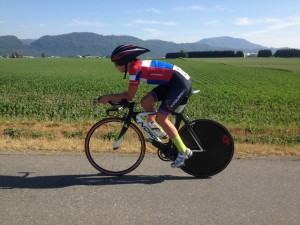 After the excitement of nationals, Erin went on to Rimouski, Quebec for the 5 stage Rimouski Internationale Tour de la Releve, where she was a guest rider with ‘Team NCCH p/b DEC Express’ coached by Rick Lee. Erin was on the Cadet team of four young ladies who won silver in the Team Time Trial. Erin went on to win the first long 78 km race, the 15 km Individual Time Trial, the 35 km Criterium and a brutally hilly and windy 76 km Road Race – these impressive wins gave Erin the overall General Classification Yellow Jersey and Gold Medal.
After the excitement of nationals, Erin went on to Rimouski, Quebec for the 5 stage Rimouski Internationale Tour de la Releve, where she was a guest rider with ‘Team NCCH p/b DEC Express’ coached by Rick Lee. Erin was on the Cadet team of four young ladies who won silver in the Team Time Trial. Erin went on to win the first long 78 km race, the 15 km Individual Time Trial, the 35 km Criterium and a brutally hilly and windy 76 km Road Race – these impressive wins gave Erin the overall General Classification Yellow Jersey and Gold Medal.
Next on Erin’s agenda is racing against adult women at BC Superweek, followed by the Rapha Pacific Northwest Juniors Classic Stage Race in Elma Washington, then onto the Western Canada Summer Games in Wood Buffalo, Alberta as a member of Team BC. Her season will continue with Track Provincials in Victoria in August and then Nationals in October at the newly-built Pan-Am velodrome in Milton, Ontario.
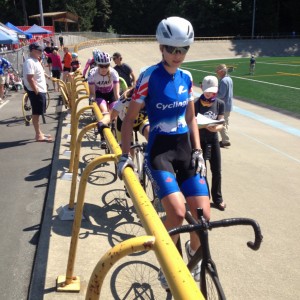 All this achievement has required a high dedication to training and considerable sacrifice. As Erin says, “doing something you love, you make sacrifices”. Her goal is to represent Canada at the World Championships and the Olympics. She says that her determination as a competitor has been inspired by her father. Others who have inspired and supported Erin are her personal coach Lister Farrar who has taught her to “never give up” and Peter Lawless, an accomplished lawyer and coach, who has been appointed Team Canada’s Ombudsperson for the Toronto 2015 Parapan American Games and the Rio 2016 Paralympic Games.
All this achievement has required a high dedication to training and considerable sacrifice. As Erin says, “doing something you love, you make sacrifices”. Her goal is to represent Canada at the World Championships and the Olympics. She says that her determination as a competitor has been inspired by her father. Others who have inspired and supported Erin are her personal coach Lister Farrar who has taught her to “never give up” and Peter Lawless, an accomplished lawyer and coach, who has been appointed Team Canada’s Ombudsperson for the Toronto 2015 Parapan American Games and the Rio 2016 Paralympic Games.
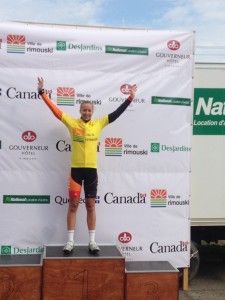 Erin has also received inspiration from Pro Rider Mical Dyck, who likes to ride with and mentor junior riders. Mical has been a role model for many and champions equity for girls and women in sport. Erin has recognized that the sport of cycling does not provide equal opportunities for males and females – and she believes (as do we) that needs to change. There are fewer opportunities for women and the prize money for winning a race is substantially less (sometimes 50% less than prizes for male winners). Erin will champion and support the Ride Like a Girl initiative to get more women and girls into mountain biking so they can experience the joy of the sport.
Erin has also received inspiration from Pro Rider Mical Dyck, who likes to ride with and mentor junior riders. Mical has been a role model for many and champions equity for girls and women in sport. Erin has recognized that the sport of cycling does not provide equal opportunities for males and females – and she believes (as do we) that needs to change. There are fewer opportunities for women and the prize money for winning a race is substantially less (sometimes 50% less than prizes for male winners). Erin will champion and support the Ride Like a Girl initiative to get more women and girls into mountain biking so they can experience the joy of the sport.
Starting in September, Erin is very excited to be entering the prestigious and highly competitive Pacific Institute for Sport Excellence (PISE) program. PISE’s mission is to ‘enhance the development of sport and physical activity excellence through a partnership approach delivering world class programs, education, innovation and facilities’. She will spend half-days at PISE four days a week, including 2.5 hours daily in the gym. The program at PISE is for athletes in all range of sports, where cross training and nutrition are emphasized. PISE has a teacher on site to assist students with their academic studies. Speaking of academics, Erin loves science and wants to enter the medical field to become a physician (like her father).
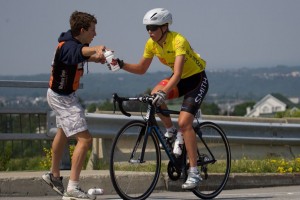 Erin is an incredibly impressive young woman with a brilliant future ahead of her. She has the determination and drive necessary to succeed at the highest level. Her enthusiasm for the sport and dedication to ensure that girls and women are provided with equal opportunities bode well for the future of women’s cycling in Canada. Erin will make a terrific mentor herself someday and young girls will look up to her as an exceptional role model. She is mature beyond her years and we wish her every success on her journey.
Erin is an incredibly impressive young woman with a brilliant future ahead of her. She has the determination and drive necessary to succeed at the highest level. Her enthusiasm for the sport and dedication to ensure that girls and women are provided with equal opportunities bode well for the future of women’s cycling in Canada. Erin will make a terrific mentor herself someday and young girls will look up to her as an exceptional role model. She is mature beyond her years and we wish her every success on her journey.
As LNG bill passes, BC at odds with global community on climate change
Media Statement July 21st 2015
As LNG bill passes, British Columbia is at odds with the global community on climate change
For Immediate Release
Victoria B.C. – British Columbia is at odds with the global community, who are calling for governments to take immediate action on addressing and mitigating climate change according to Andrew Weaver, MLA for Oak Bay-Gordon Head and Deputy Leader of the B.C. Green Party. This statement comes a week after calling for an emergency debate on whether B.C. legislators are acting with sufficient urgency or demonstrating the leadership needed to mitigate and prepare for climate change.
Yesterday, twenty four of the UK’s foremost academic and professional institutions – including the British Academy, the Royal Society, and the Learned Society of Wales – released a statement that said “responding to the challenge [of climate change] will require deploying the full breadth of human talent and invention. Creative policy interventions and novel technological solutions need to be fostered and applied… Capturing this potential quickly and effectively will drive economic progress.”
“Today the B.C. Liberals are forcing through legislation that they desperately hope will land a single LNG investment,” said Weaver. “At a time when it is imperative that we are making meaningful investments in low-carbon technologies, the B.C. Liberals are pulling out the stops to build fossil fuel infrastructure that will commit the province to an energy-intensive non-renewable industry for the foreseeable future.”
In reference to the regional droughts, forest fires, lack of snowpack, and fishery closures currently affecting B.C., Andrew Weaver last week urged the House suspend discussion of LNG legislation to discuss the government’s inaction on climate change. Responding to MLA Weaver’s statement, Finance Minister Michael de Jong said, “…we have certainly experienced some extreme conditions in the province these past number of weeks that have contributed to some challenging circumstances. We heard about that earlier from the minister. Nor do I doubt the member’s interest and commitment to addressing some of the underlying issues that may or may not be contributing to that. Having said that, we are also bound and obliged to conduct proceedings in this chamber pursuant to the standing orders.”
Both the BC NDP and the BC Liberals argued against having an emergency one hour debate on climate change.
“The juxtaposition of the B.C. government being called into a summer session to push LNG legislation through, unwilling to spend an hour discussing our response to climate change while salmon are dying in warm rivers before they can spawn, Gulf Islands are starting to truck in fresh water, and the Premier’s own riding is on fire is incredibly striking, and only further highlights the inaction we are seeing” said Weaver.
“British Columbia has all the tools it needs to tackle climate change head on; we have the renewable resources required, and the innovative, creative, and inspired population,” said Andrew Weaver. “The missing element is a government willing to demonstrate the leadership required to focus the efforts. Right now they seem content to continue rearranging deck chairs on the Titanic.”
-30-
Media contact
Mat Wright
Press Secretary – Andrew Weaver MLA
Cell: 250 216 3382
Mat.wright@leg.bc.ca
Twitter: @MatVic
Parliament Buildings
Room 027C
Victoria BC V8V 1X4
Bill M229 — Energy and Water Efficiency Act, 2015
Today in the legislature I rose to table Private Members’ Bill entitled: Bill M229 — Energy and Water Efficiency Act, 2015. As I noted in introducing it, this Bill was originally tabled by the Liberal government in 2012 as Bill 32 — Energy and Water Efficiency Act. The Bill received support from all sides of the legislature when it was introduced in 2012. Unfortunately, it was never brought to the Committee of the whole house and subsequently third reading. We missed an opportunity in 2012 to pass this legislation. I hope that the government chooses to pick this up at this time.
Text of the Introduction of my Bill
I’m pleased to introduce a bill intituled the Energy and Water Efficiency Act. If this title sounds familiar, it’s because the act was initially introduced in 2012 and passed second reading with the support of the official opposition on April 24, 2012, but the Committee of the Whole House was never called during the fourth session of the 39th Parliament and so the bill died on the order paper.
This bill reflects the new language in the Greenhouse Gas Industrial Reporting and Control Act. As noted by the Minister of Energy and Mines at the time, this bill would reduce consumers’ energy bills and lower operating costs for B.C. businesses. This legislation replaces the current Energy Efficiency Act and would enable administrative penalties to ensure manufacturers, distributors and retailers comply with energy efficiency guidelines, broaden the scope of energy efficiency requirements to include commercial energy systems, industrial reporting on water efficiency and enable the minister responsible to enact regulations for technical standards.
It was a fine, widely supported piece of legislation that was introduced after engaging more than 40 organizations and 60 individuals representing industry, utilities, governments, public interest and academia.
I move the bill be placed on the orders of the day for second reading at the next sitting of the House after today.

